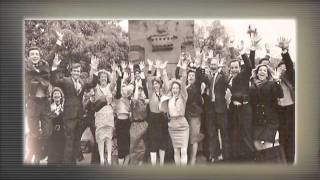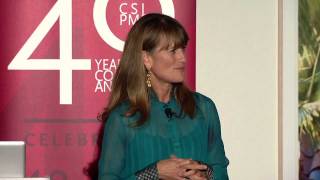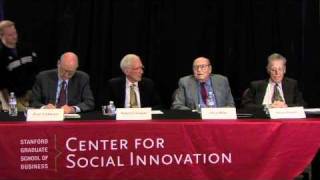In 2011, the 10-year-old Center for Social Innovation and the 40-year-old Public Management Program celebrated the school’s 40-year commitment to educating socially-conscious leaders.
Fellow Stanford GSBers interested in education, environment, health care or international development, in nonprofits, policy/government, philanthropy, social ventures and responsible business shared their story of impact with our 40-year strong community of leaders who understands and contributes to society and the world around them.
40 Years of Educating Socially-Conscious Leaders
In response to the historical events of the late 60’s and the growing societal demands on business, the Stanford Graduate School of Business developed a pioneering vision for educating leaders who understand the world they live in and know to work across silos to accommodate the needs of both business and society. The Public Management Program (PMP), created 40 years ago, was the first of its kind then.
While the PMP kept reinventing itself to meet the needs of new generations of leaders, the now 10-year-old Center for Social Innovation expanded the work of the PMP to a larger audience of executives and set on a course to create a field of social innovation, a journey that led to the launch of multiple academic centers for social innovation around the world and the creation of the White House Office for Social Innovation in the United States.
Feeling confident that the work of the Stanford community will be supported by a larger global movement, the Center and the PMP program focus their future efforts at home to nurture and support the efforts of Stanford’s social innovators, a group of extraordinary people and the stars of our upcoming anniversary event.
1971–1986: Preparing Students to Work in or with Government
In 1971, Dean Arjay Miller founds the Urban Management Program, soon to become the Public Management Program (PMP). The program strives to equip those aspiring to public service careers with strong analytical and managerial skills, and to prepare those headed for business careers to handle their relationship with the public sector effectively. New faculties are brought in and new courses developed. Ten years later, the Stanford Management Internship Fund (SMIF) is launched to encourage students to commit to summer internships in the public or nonprofit sector. The first issue of the PMP Forum newsletter is published in 1983.
1987–1995: Student Initiative Expands Public Management Program to the Nonprofit World
Following a decrease in student involvement, a ground swell of student support lobbies the administration for expanded staff support, better public management issue representation in core classes, and more focused faculty involvement. The Public Management Program evolves into a student-centric organization and experiences a renewal starting with the launch of the Public Management Initiative, a year-long academic effort focused on a current social, environmental, or public issue.
The school launches the loan forgiveness program, which provides financial relief for MBAs accepting public or nonprofit positions after graduation. The Alumni Consulting Team (ACT) is born and develops into a model for linking the management skill of business professionals with the needs of nonprofit organizations.
By 1989, PMP has the highest enrollment in its history to date, and students create a vast array of new initiatives and clubs, including I Have a Dream, Start Up, and MBAid. In 1990, The Conradin von Gugelberg Memorial Lecture on the Environment series is started.
1996–2000: The Rise of Social Entrepreneurship and Social Innovation
The 1996-97 Public Management Initiative on social entrepreneurship leads to new faculty, cases, and courses. The Board Fellows program is started and provides students with nonprofit board apprenticeship opportunities. The first of its kind in the country, Board Fellows is mirrored by many other MBA programs across the nation. By its 25th anniversary, the Public Management Program adds specializations in social entrepreneurship, nonprofit management, and public policy, with emphases in education, environment, or health care. There are 21 PMP electives offered. In 1999, the Center for Social Innovation is established.
2001–2010: Building the Field of Social Innovation
The Center for Social Innovation becomes a hub for students, alumni, and field practitioners to develop innovative solutions to social problems. The Center develops an Executive Education portfolio to serve social innovators from around the world. CSI launches the Stanford Project on the Evolution of Nonprofits (SPEN), a multi-year research study on nonprofit management practices. PMP and ACT become fully integrated into CSI, leveraging all programs for social change.
The Center launches the Stanford Social Innovation Review, a quarterly publication to advance, educate, and inspire global social innovators. Following that launch, CSI creates a podcast channel, Social Innovation Conversations, to host field dialogs and disseminate knowledge and world-changing ideas. Stanford GSB hosts the Net Impact 2005 Conference, followed by a number of conferences and workshops designed to accelerate the diffusion of best practices.
The Service Learning Initiative is established to provide global immersion trips that connect Stanford MBAs and faculty with recognized social innovators from all sectors. Social Innovation Fellows is created, which offers year-long fellowships to graduating MBAs to pursue their social ventures.
During this period, multiple centers for social innovation are formed throughout the world, and in 2009, the White House creates an Office for Social Innovation and Civic Participation. Between 2003 and 2011, Stanford is awarded the top ranking in the Aspen Institute’ “Beyond Grey Pinstripes” survey six out of eight years. The Certificate in Public Management becomes the Certificate in Public Management and Social Innovation, while Impact Investing Fellows is created to provide students with grant-making and impact-investing learning opportunities.



